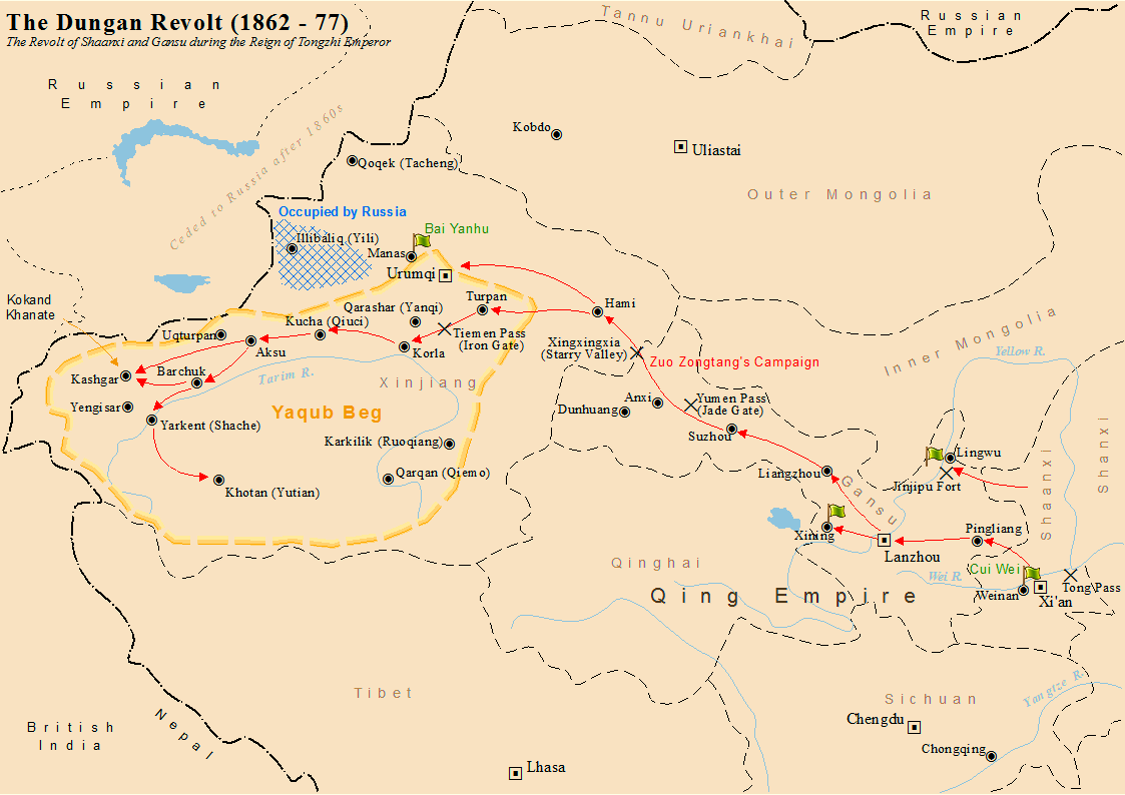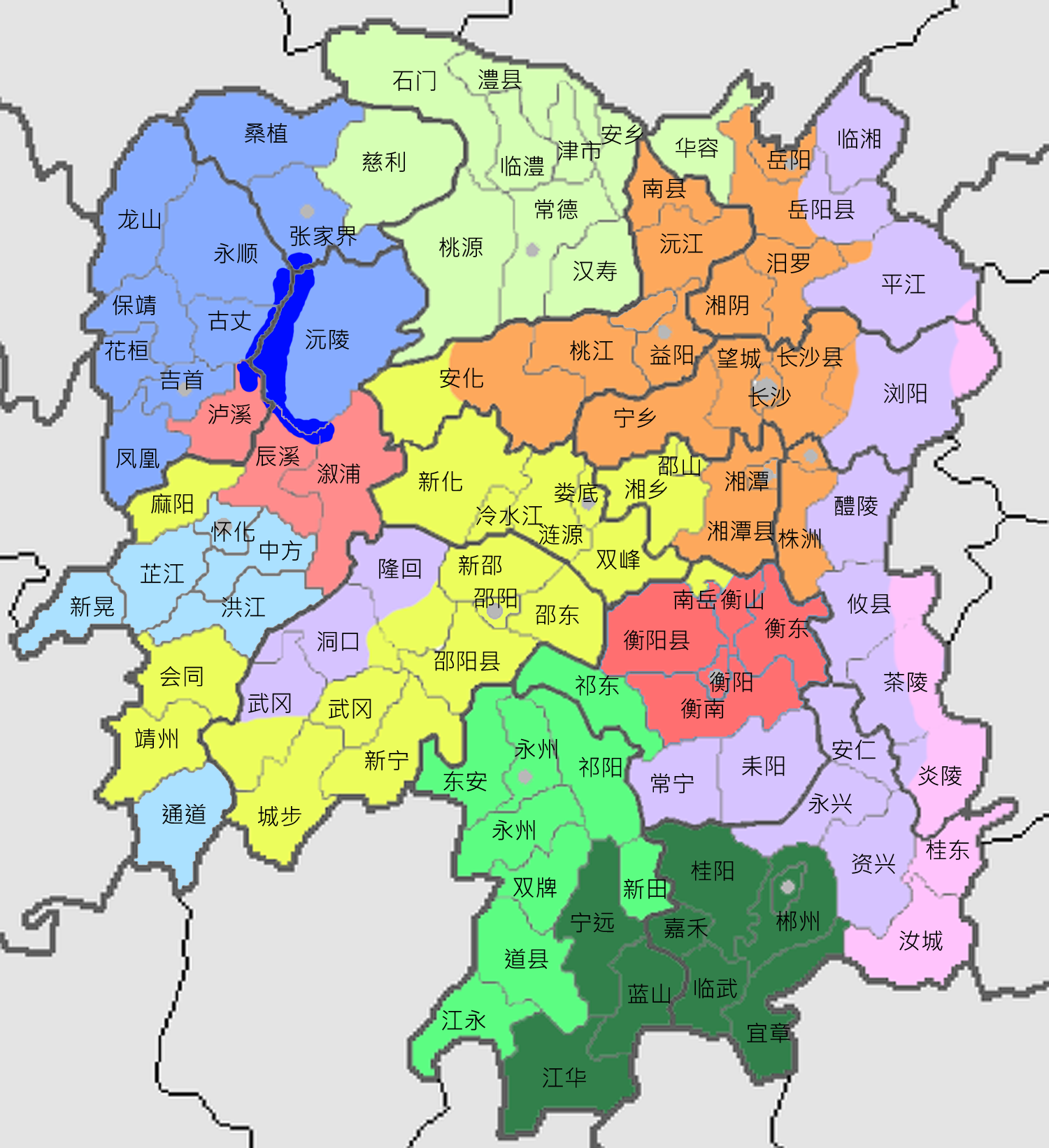|
Zuo Zongtang
Zuo Zongtang (左宗棠, Xiang Chinese: ; Wade-Giles spelling: Tso Tsung-t'ang; November 10, 1812 – September 5, 1885), sometimes referred to as General Tso, was a Chinese statesman and army officer of the late Qing dynasty. Born in Xiangyin County, Hunan Province, Zuo started his career in the Qing military by participating in the campaign against the Taiping Rebellion in 1851. After capturing Hangzhou from the Taiping rebels in 1864, he was enfeoffed as a first class count. In 1866, Zuo oversaw the construction of the Foochow Arsenal and naval academy. That same year, he was reassigned to serve as the Viceroy of Shaan-Gan, where he oversaw industrialization in Gansu Province. In 1867, he was appointed as an Imperial Commissioner in charge of military affairs in Gansu. During his term as Imperial Commissioner in Gansu, he participated in the suppression of the Nian Rebellion. By the late 1870s, he had crushed the Dungan Revolt and recaptured Xinjiang Province from ... [...More Info...] [...Related Items...] OR: [Wikipedia] [Google] [Baidu] |
Royal And Noble Ranks Of The Qing Dynasty
The Qing dynasty (1644–1912) of China developed a complicated peerage system for royal and noble ranks. Rule of inheritance In principle, titles were downgraded one grade for each generation of inheritance. * Direct imperial princes with the ''Eight Privileges'' were downgraded for four generations, after which the title can be inherited without further downgrades. * Direct imperial princes without the ''Eight Privileges'' were downgraded until the rank of ''feng'en jiangjun'', which then became perpetual. * Cadet line imperial princes and lords were downgraded until they reached ''feng'en jiangjun'', which could be further inherited three times before the title expired completely. * For non-imperial peers, the title could be downgraded to ''en jiwei'' before becoming perpetually heritable. Occasionally, a peer could be granted the privilege of ''shixi wangti'' ( zh, t=世襲罔替, p=shìxí wǎngtì, labels=no; "perpetual heritability"), which allowed the title to be p ... [...More Info...] [...Related Items...] OR: [Wikipedia] [Google] [Baidu] |
Yueyang
Yueyang, formerly known as Yuezhou or Yochow, is a prefecture-level city on the eastern shores of Dongting Lake and the Yangtze river in the northeastern corner of Hunan Province in the People's Republic of China. Yueyang has an administrative area of and the city proper, . The population was 5,051,922 at the 2020 Chinese census whom 1,134,058 lived in the built-up (or metro) area made up of Yueyanglou District and Yunxi District, Junshan District not being conurbated. Yueyang is the only international trade port city in Hunan and a famous port city in China, at the same time, Yueyang's comprehensive economic strength ranks of Hunan second only to Changsha, the provincial capital. The city's most famous attractions are the Yueyang Tower and Dongting Lake. The most famous food is Dongting lake silver fish (). In 2021, the city's permanent resident population was 5,051,922, a decrease of 424,162 from the end of last year. Administration The Yueyang prefecture is made up o ... [...More Info...] [...Related Items...] OR: [Wikipedia] [Google] [Baidu] |
Imperial Commissioner (China)
Imperial Commissioner (; Manchu: ''hese i takūraha amban'') was a high-ranking government official or military general commissioned by the emperor of China during the late Ming (13681644) and Qing (16441912) dynasties. His power was just below that of the emperor, such that he could command viceroys and provincial governors by imperial edict. Functions Main responsibilities Negotiations with foreign powers, for example Lin Zexu, Qishan and Shen Baozhen) as well as treaty ratification as exemplified by Qiying, Yixin, Prince Gong and Li Hongzhang. Manage aid and unite local government in response to large-scale natural disasters. Subsidiary responsibilities Military recruitment and transport. Examples include Tan Lun, Hong Chengchou, Xiang Rong, Zuo Zongtang and Yuan Shikai List of Imperial Commissioners (middle and late Ming dynasty) Imperial Commissioners received a sword of office from the emperor. * 1555: Tan Lun ''wokou'' suppression * 1564: ... [...More Info...] [...Related Items...] OR: [Wikipedia] [Google] [Baidu] |
Gansu
Gansu is a provinces of China, province in Northwestern China. Its capital and largest city is Lanzhou, in the southeastern part of the province. The seventh-largest administrative district by area at , Gansu lies between the Tibetan Plateau, Tibetan and Loess Plateau, Loess plateaus and borders Mongolia's Govi-Altai Province, Inner Mongolia and Ningxia to the north, Xinjiang and Qinghai to the west, Sichuan to the south and Shaanxi to the east. The Yellow River passes through the southern part of the province. Part of Gansu's territory is located in the Gobi Desert. The Qilian Mountains, Qilian mountains are located in the south of the Province. Gansu has a population of 26 million, ranking List of Chinese administrative divisions by population, 22nd in China. Its population is mostly Han Chinese, Han, along with Hui people, Hui, Dongxiangs, Dongxiang and Tibetan people, Tibetan minorities. The most common language is Mandarin. Gansu is among the poorest administrative divi ... [...More Info...] [...Related Items...] OR: [Wikipedia] [Google] [Baidu] |
Foochow Arsenal
The Foochow Arsenal, also known as the Fuzhou or Mawei Arsenal, was one of several shipyards created by the Qing Empire and a flagship project of French assistance to China during the Self-Strengthening Movement. The shipyard was constructed under orders from Li Hongzhang and Zuo Zongtang and was situated in Mawei (, romanized as Mamoi in that period), a port town within the jurisdiction of Fuzhou '' fu'' (then romanized as "Foochow"), which is several miles up the Min River. History Planning for the shipyard, the Fuzhou Naval College and other facilities began in 1866. Construction began in 1867. Two French Naval officers, Prosper Giquel and Paul d'Aiguebelle, both on leave from the French Imperial Navy, were contracted to recruit a staff of about forty European engineers and mechanics, and to oversee the construction of a metal-working forge, the creation of a Western-style naval dockyard, the construction of eleven transports and five gunboats, and the establishment of ... [...More Info...] [...Related Items...] OR: [Wikipedia] [Google] [Baidu] |
Hangzhou
Hangzhou, , Standard Mandarin pronunciation: ; formerly romanized as Hangchow is a sub-provincial city in East China and the capital of Zhejiang province. With a population of 13 million, the municipality comprises ten districts, two counties, and one county-level city in northwestern Zhejiang. It is situated at the head of Hangzhou Bay and the estuary of the Qiantang River. Established as a county seat in 221 BC, Hangzhou later served as the capital of the Wuyue Kingdom (923–997) and the Southern Song dynasty (1138–1276). The city has three UNESCO World Heritage Sites, which are the West Lake Cultural Landscape, the Grand Canal, and the Archaeological Ruins of Liangzhu City. Hangzhou is designated as a sub-provincial city. Hangzhou ranked ninth in GDP among mainland Chinese cities and 14th according to the Global Innovation Index. The city hosts the headquarters of Alibaba Group, Ant Group, DeepSeek, Geely, and NetEase. According to the Nature Index, it ... [...More Info...] [...Related Items...] OR: [Wikipedia] [Google] [Baidu] |
Xiang Chinese
Xiang or Hsiang ( Chinese: 湘; Changsha Xiang: , Mandarin: ), also known as Hunanese, is a group of linguistically similar and historically related Sinitic languages, spoken mainly in Hunan province but also in northern Guangxi and parts of neighboring Guizhou, Guangdong, Sichuan, Jiangxi and Hubei provinces. Scholars divided Xiang into five subgroups: Lou–Shao (Old Xiang), Chang–Yi (New Xiang), Chen–Xu or Ji–Xu, Hengzhou, and Yong–Quan. Among those, Lou–Shao, or Old Xiang, still exhibits the three-way distinction of Middle Chinese obstruents, preserving the voiced stops, fricatives, and affricates. Xiang has also been heavily influenced by Mandarin, which adjoins three of the four sides of the Xiang-speaking territory, and Gan in Jiangxi Province, from where a large population immigrated to Hunan during the Ming dynasty. Xiang-speaking Hunanese people have played an important role in Modern Chinese history, especially in those reformatory and revolutionary m ... [...More Info...] [...Related Items...] OR: [Wikipedia] [Google] [Baidu] |
Zuo (surname)
Zuo () is a Chinese surname. It is the 187th name listed on the ''Hundred Family Surnames'' poem. People * Zuo Zongtang (左宗棠) (1812–1885), Qing dynasty Han Chinese General, the inspiration for General Tso's chicken * Zuo Baogui (左寶貴) (1837–1894), Qing dynasty Hui Chinese General * Zhang Zuo (pianist) (左章) (born 1989), Chinese-American pianist * Zuo Xiaoqing (Chinese: 左小青; born 1977) Chinese actress, TV presenter and former rhythmic gymnast. * Zuo Caiyun (born 1996), Chinese para-athlete See also * List of common Chinese surnames These are lists of the most common Chinese surnames in the China, People's Republic of China (Hong Kong, Macau, and Mainland China), the Taiwan, Republic of China (Taiwan), and the overseas Chinese, Chinese diaspora overseas as provided by govern ... References {{DEFAULTSORT:Zuo (Surname) Chinese-language surnames Individual Chinese surnames ... [...More Info...] [...Related Items...] OR: [Wikipedia] [Google] [Baidu] |
Imperial Examination
The imperial examination was a civil service examination system in History of China#Imperial China, Imperial China administered for the purpose of selecting candidates for the Civil service#China, state bureaucracy. The concept of choosing bureaucrats by merit rather than by birth started Imperial examination in Chinese mythology, early in Chinese history, but using written examinations as a tool of selection started in earnest during the Sui dynasty (581–618), then into the Tang dynasty (618–907). The system became dominant during the Song dynasty (960–1279) and lasted for almost a millennium until its abolition during the late Qing reforms, late Qing dynasty reforms in 1905. The key sponsors for abolition were Yuan Shikai, Yin Chang and Zhang Zhidong. Aspects of the imperial examination still exist for entry into the civil service of both China and Taiwan. The exams served to ensure a common knowledge of writing, Chinese classics, and literary style among state officials. ... [...More Info...] [...Related Items...] OR: [Wikipedia] [Google] [Baidu] |
Jinshi
''Jinshi'' () was the highest and final degree in the imperial examination in Imperial China. The examination was usually taken in the imperial capital in the palace, and was also called the Metropolitan Exam. Recipients are sometimes referred to in English-language sources as Imperial Scholars. The ''jinshi'' degree was first created after the institutionalization of the civil service exam. Initially it had been "for six categories" but was later consolidated into a single degree. The examination system first appeared during the Han dynasty, but the ''jinshi'' degree first appeared under the reign of Emperor Yang of Sui. During the Tang dynasty, every year around one to two percent of test takers would obtain a ''jinshi'' title out of a total of one to two thousand test takers. The numbers of ''jinshi'' degrees given out were increased in the Song dynasty, and the examinations were given every three years. Most senior officials of the Song dynasty were ''jinshi'' holders. T ... [...More Info...] [...Related Items...] OR: [Wikipedia] [Google] [Baidu] |
Tomb Of Zuo Zongtang
The Tomb of Zuo Zongtang () is the tomb of Zuo Zongtang, a Chinese statesman and military leader of the late Qing dynasty (1644–1911). The tomb dates from 1886, and is located in Tiaoma Town of Yuhua District, Changsha, Hunan, China. It has been categorized as a provincial level key cultural heritage in 1996 by the Hunan Provincial Government. History The tomb was built for Zuo Zongtang, who was a statesman and military leader of the late Qing dynasty (1644–1911). The tomb is located in Tiaoma Town of Yuhua District, Changsha, Hunan. When Zuo Zongtang died in 1885 in Fuzhou, Fujian, he was buried in here in the following year. During the Cultural Revolution, the Red Guards The Red Guards () were a mass, student-led, paramilitary social movement mobilized by Chairman Mao Zedong in 1966 until their abolition in 1968, during the first phase of the Cultural Revolution, which he had instituted.Teiwes According to a ... blasted open an entrance way and entered the tomb, ... [...More Info...] [...Related Items...] OR: [Wikipedia] [Google] [Baidu] |



